职业高中英语基础模块上册Unit10
中职职业英语 基础英语模块第十单元教案
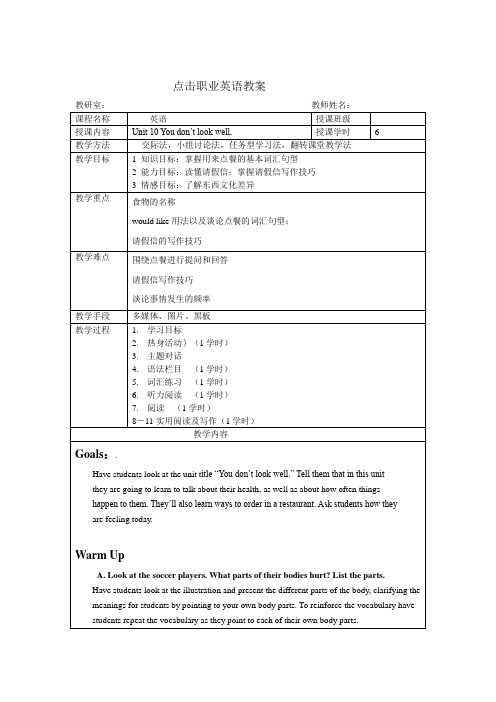
点击职业英语教案教研室:教师姓名:Andy is not feeling well.GrammarOrdering in a restaurantE xplain that ’d is the contracted form of would. Direct students’ attention toLanguage Zoom In to reinforce this point and model the pronunciation for them.Focus students’ attention o n the chart and go through the affirmative statements, yes/no questions, and short answers.Explain that in affirmative short answers we don’t use the contracted form of would (’d).’d = wouldA.PAIR WORK Complete the conversation. Then take turns. Role-playthe conversation.Have students complete the dialog using expressions from the chart above.Answer key: Would, like, like, What, like, I’dB. PAIR WORK Take turns. Order items on the menu.Working with their partner, have students take turns playing the role of waiter or waitressand customer. Tell students that the customer should order items from the menu and thewaiter or waitress should write down the order. Then they should check together that theorder is correct. Tell students to use the dialog in Exercise A to help them.C. Pair work. Practice these dialogs with your partner.Amy: I’m hungry.John: Me too.Amy: Let’s get something to eat.John: Sounds good to me.Amy: Would you like to go to that new Chinese restaurant?John: Sure.Talking about how often things happenDraw the diagram on the board with the numbers along the baseline as percentages(0%, 25%,50%, 75%, 100%).Explain to students that they are going to learn to talk about how often they do things.Start with 100% and tell them when they do something every day, or 100% of thetime, we use the expression always.A. Read the lunch schedules and complete the sentences. Use never, rarely, sometimes,usually, or always.Elicit from students when we use always(= 100%), usually (= 75%),sometimes (= 50%–75%), rarely (= less than 25%), and never (= 0%).Have students look at the chart of lunch schedules and ask them “How often does Mikehave lunch at a restaurant?” “And at the office?” “And at home?” “What about at school?”Responses:sometimes, sometimes, rarely, neverB.PAIR WORK Take turns. Ask and answer questions about Mike, Ken, Nathan,and Ben.Organize students into pairs and have them look at the example. Tell students to take turns asking questions similar to those in Exercise A about Mike, Ken, Nathan, and Ben. Partners should answer the questions using the information in the chart.C. Listen. What do you hear? Check the correct box.Tell students they are going to listen to six sentences with the adverbs of frequency andshould listen for each adverb.Vocabulary in ContextTalking about health problems and giving adviceHave students look at the illustrations on this page and tell students these people are not。
职高英语基础模块(上)第10单元课件配套教案

Useful phrases and ressions
8. at the end of 9. look for 10. comp up (with sth.) 11. think of (sth./doing sth.) 12. take part in 13. not … any more/longer 14. so/such … that …
8. 在……结尾/末端 9. 寻找 10.长出来,被提出,出现 11. 考虑,想起 12. 参加,参与 13. 不再,再也不 14. 如此……以致于……
1. With great joy, the Greeks sent a soldier who was good at running, back to Athens to tell their people the news of victory. 2. Pheidippides was eager to get to Athens as soon as possible, so he ran the whole distance without stopping. 3. He was tired, but he did not give up. He kept on running and running. 4. When he finally got to the city of Athens, he couldn’t move any more.
Useful Sentences
Useful Sentences
5. Now every four years at the Olympic Games, one of the important events is the marathon. 6. The distance of 42.195 km is such a long way to run that not all the runners can finish the race. 7. The important thing in the Olympic Games is not winning, but taking part. 8. They take part in a marathon race to show their strength and will.
(2020年整理)职业高中英语基础模块上册Unit10.doc

Unit10一、语音知识:从ABCD 四个选项中找出其划线部分与所给单词划线部分读音相同的选项。
二、词汇与语法知识:从ABCD 四个选项中选出可以填入空白处的最佳选项( )6. She is ______ a lovely girl that we all like her very much.A. soB. suchC. tooD. enough( )7. You have ______ little money that you can’t afford to buy _____ a big house.A. so; soB. such; suchC. so; suchD. such; so( )8. Don’t do it like this _____ next time.A. any longB. no moreC. no longerD. any more( )9. Do you know who ______ the gold medal?A. wonB. winC. defeatD. defeated( )10. As we all known, Japan lies _____ the east of China.A. inB. onC. toD. at( )11. ---How often do you write to your sister?---_______A. Twice a monthB. Second times a monthC. Second a time a monthD. A second time a month( )12. “Not all the students can understand the teacher in class”means _____.A. All the students can’t understand the teacher in classB. None of the students can understand the teacher in classC. No students can understand the teacher in classD. All the students understand the teacher in class( )13. Do you want to ______ part in the game?A. joinB. takeC. join inD. joined( )14. When did your brother _____ the army?A. joinedB. join inC. take part inD. join( )15. People put vegetables in the bridge in order to _____ them fresh.A. keepB. stayC. makeD. let( )16. There is a stone bridge _____ the river.A. overB. aboveC. atD. On( )17. The Great Wall runs _____ north China like a huge dragon.A. overB. onC. crossD. across( )18. She was angry _____ the damage, and _____ the driver for having caused it.A. at; atB. at; withC. with; withD. with; at( )19. Your composition is good ______ a few mistakes here and there.A. besidesB. exceptC. except forD. except that( )20. He decided to visit the family ______ Friday night.A. atB. inC. onD. Over( )21. A battle _____ the Persians and the Greeks happened.A. betweenB. amongC. fromD. for( )22. When he _____ the mountain at last, he was out of breath.A. reached toB. arrived toC. gotD. got to( )23. _____ great joy, they rushed to the street.A. AtB. WithC. ByD. Under( )24. He thought over and over and at last a good idea _____.A. comes outB. came onC. comes upD. came along( )25. She is ______ silent girl that she seldom talks.A. suchB. such aC. such anD. so( )26. Sorry, all the tickets _____.A. has sold outB. have sold outC. has been sold outD. have been sold out( )27. Sorry to keep you _____ for so long outside.A. waitB. waitedC. waitingD. to wait( )28. He has been a taxi driver ______ he resigned (辞职).A. afterB. sinceC. fromD. when( )29. _____ while the iron is hot.A. StrikeB. HitC. BeatD. Fight( )30. I can’t _____ his name.A. callB. recallC. callingD. recalling三、完形填空:阅读下面的短文,从所给的ABCD 四个选项中选出正确的答案。
中职教育-英语(基础模块)上册第十章 Unit10:We should take a vacation.ppt

vacation .
旅游计划
英语(基础模块)目录页Fra bibliotekCONTENTS PAGE
Part 1 Part 2 Part 3 Part 4 Part 5 Part 6 Part 7
Warm up Listening and Speaking
Pronunciation Reading and Writing
6
过渡页
TRANSITION PAGE
Part 2 Listening and Speaking
A second honeymoon
Bob : What’s wrong ,Nancy ? Are you tired ? Nancy : Yes . You know , we’re working too hard . We should take a vacation . Bob : Why don’t we drive to Arizona and visit the Grand Canyon ? We could also take a boat
Who do you usually go with? ______a. Family . ______b. Friends. ______c . Alone .
Which do you prefer? ______a. go shopping and sightseeing. ______b. relax by beach and swim . ______c . Enjoy outdoor activities like
We wish you a great trip !
19
过渡页
TRANSITION PAGE
中职《英语 基础模块》上册 Unit 10 Sports课件
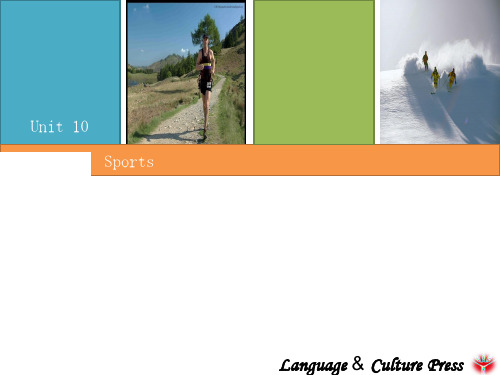
2022/11/10
Language & Culture Press
Teaching Procedures be good at
• She is good at singing pop songs. 她擅长于流行歌曲。
• I am good at playing football. 我擅长踢足球。
2022/11/10
Language & Culture Press
Teaching Procedures
not all all ... not...
• Not all the boys in our class are tall. 我们班级并非所有男孩都高。
• All the boys in our class are not tall. 我们班所有男生都不高。
Grammar
• 1.表示时间的常用介词 1)at “在几点钟”。如:at 5 p.m. 2)in “在某年、某月、某季节;在上
午、在下午、在傍晚...” 如:in the morning
3)on “在某天、某天早上、某天下午” 如:on a Monday morning
2022/11/10
Language & Culture Press
• I am thinking of going to Europe this summer. 我在考虑今年夏天去欧洲。
2022/11/10
Language & Culture Press
Teaching Procedures
such ... that ...
• She is such a lovely girl that we all like her. 她是一个如此可爱的女孩以至于我们都喜 欢她。
外研中职国规英语教材基础模块(修订版)第一册unit10happynewyear
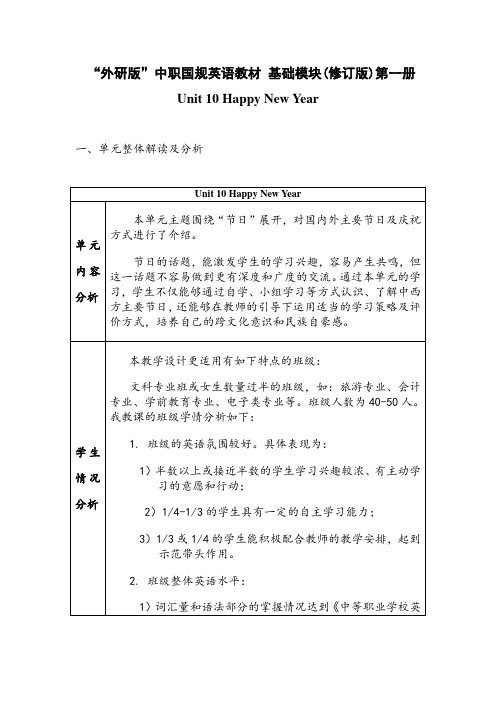
“外研版”中职国规英语教材基础模块(修订版)第一册Unit 10 Happy New Year一、单元整体解读及分析语教学大纲》的基本要求;2)具备一定的口语能力(较好的学生能进行不少于10句的简单对话交谈);3)写作能力薄弱。
3. 在语言输入输出方面可能存在的困难:1)听力辨音方面仍然是弱点;2)阅读方面存在长句、长篇阅读的困难;3)将所学词汇、语法用于基本的写作仍然是教学难点。
4. 部分学生存在的困难:1)仍有部分学生词汇量不够,达不到大纲的基本要求;2)已掌握的语法很薄弱,不能支持阅读的有效进行;3)积极与消极学习情绪时有交替;4)自信心不够,得到肯定、鼓励的机会很少。
5. 教师可能忽略的问题:1)如何保证小组合作学习的效果持久;2)课堂形成性评价是否有效;3)对存在学习困难的学生有忽略,未给予足够的关注和肯定;4)为完成教学任务而赶进度,没有对教材资源进行有效整合。
预设的解决办法:1. 分层教学与合作学习相结合。
将学生分层分组,每组二、分课时教学设计第1-2课时第3-4课时Summary1. 学生完成My ProgressCheck及自我评估。
2. 学生完成本单元小组互评。
评价标准:课堂参与度:课堂发言次数、小组讨论参与情况等;学习成果展示情况;哪方面能力得到提高。
Homework作者简介: 夏晴,女,任职于重庆市沙坪坝区教师进修学院。
2007年被评为重庆市沙坪坝区英语学科骨干教师,曾主持区级中职英语课题研究。
多次获国家级、市级中职英语教师技能大赛说课(赛课)一等奖,多次承担市、区级观摩示范课;指导多名青年教师获市、区级中职英语教师说课(赛课)一等奖。
新课标中职《英语(基础模块)上》Unit 10-Safe Online

Safe Online
After learning this unit, you’ll be able to:
1 describe the Internet life 2 be familiar with English expressions related
to network security
Pronunciation
Letter Combinations ear, eer, ere, or, oo, oa, oe, oi, oy
字母组合 ear 的发音情况: /eə/ bear wear pear /ɪə/ ear hear near tear clear /ɜː/ early earth heard search learn 字母组合 eer 的发音情况: /ɪə/ beer deer cheer peer engineer 字母组合 ere 的发音情况: /ɪə/ here sincere mere /eə/ there where therefore
search for information;
check emails;
listen to music
Warming-up
II. Discuss. Can you talk about the advantages and disadvantages of the Internet?
For example: Advantages: We can order food or medicine online. It is very convenient. ... Disadvantages: Sometimes it’s not very safe online. Some bad people use the Internet to cheat others. ...
职业高中英语基础模块上册Unit10
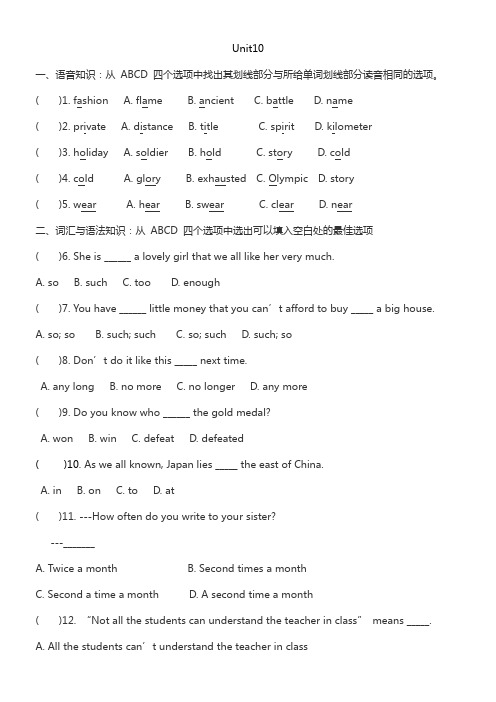
Unit10一、语音知识:从ABCD 四个选项中找出其划线部分与所给单词划线部分读音相同的选项。
二、词汇与语法知识:从ABCD 四个选项中选出可以填入空白处的最佳选项( )6. She is ______ a lovely girl that we all like her very much.A. soB. suchC. tooD. enough( )7. You have ______ little money that you can’t afford to buy _____ a big house.A. so; soB. such; suchC. so; suchD. such; so( )8. Don’t do it like this _____ next time.A. any longB. no moreC. no longerD. any more( )9. Do you know who ______ the gold medal?A. wonB. winC. defeatD. defeated( )10. As we all known, Japan lies _____ the east of China.A. inB. onC. toD. at( )11. ---How often do you write to your sister?---_______A. Twice a monthB. Second times a monthC. Second a time a monthD. A second time a month( )12. “Not all the students can understand the teacher in class”means _____.A. All the students can’t understand the teacher in classB. None of the students can understand the teacher in classC. No students can understand the teacher in classD. All the students understand the teacher in class( )13. Do you want to ______ part in the game?A. joinB. takeC. join inD. joined( )14. When did your brother _____ the army?A. joinedB. join inC. take part inD. join( )15. People put vegetables in the bridge in order to _____ them fresh.A. keepB. stayC. makeD. let( )16. There is a stone bridge _____ the river.A. overB. aboveC. atD. On( )17. The Great Wall runs _____ north China like a huge dragon.A. overB. onC. crossD. across( )18. She was angry _____ the damage, and _____ the driver for having caused it.A. at; atB. at; withC. with; withD. with; at( )19. Your composition is good ______ a few mistakes here and there.A. besidesB. exceptC. except forD. except that( )20. He decided to visit the family ______ Friday night.A. atB. inC. onD. Over( )21. A battle _____ the Persians and the Greeks happened.A. betweenB. amongC. fromD. for( )22. When he _____ the mountain at last, he was out of breath.A. reached toB. arrived toC. gotD. got to( )23. _____ great joy, they rushed to the street.A. AtB. WithC. ByD. Under( )24. He thought over and over and at last a good idea _____.A. comes outB. came onC. comes upD. came along( )25. She is ______ silent girl that she seldom talks.A. suchB. such aC. such anD. so( )26. Sorry, all the tickets _____.A. has sold outB. have sold outC. has been sold outD. have been sold out( )27. Sorry to keep you _____ for so long outside.A. waitB. waitedC. waitingD. to wait( )28. He has been a taxi driver ______ he resigned (辞职).A. afterB. sinceC. fromD. when( )29. _____ while the iron is hot.A. StrikeB. HitC. BeatD. Fight( )30. I can’t _____ his name.A. callB. recallC. callingD. recalling三、完形填空:阅读下面的短文,从所给的ABCD 四个选项中选出正确的答案。
2019-2020年高教版中职英语(基础模块第1册)Unit10《HowcanIimprovemyenglish》教案

2019-2020年高教版中职英语(基础模块第1册)Unit 10《How can I improve my english》word教案一、教学分析1. 教学内容:本课时系教材《英语1》(基础模块高教版)第十单元的第一课时,包括Lead- in + listening and speaking两部分。
具体内容为:有关谈论英语学习中的各种困难及学习建议的词汇、句型,以及相关的对话。
这些内容为整个单元的学习活动提供很好的知识储备,使下面一系列的活动展开能顺利进行。
而且,本单元的话题是如何提高英语学习。
2. 教学重点、难点:(1)教学重点:听懂并掌握有关英语学习中的各种困难及建议的词汇、句式。
(2)教学难点有关英语学习的词汇和句型。
二、教学目标1. 知识目标:(1)掌握与英语有关的词汇:forget; understand; pass English exams; difficult; pronunciation; remember; memorize; be able to; mention; be poor at; not be good at; etc(2) 掌握表达英语学习难和提出建议的句型:①I can’t understand /read/ remember…②I’m poor at…I’m not good at…③I find it difficult to…? ④I feel it too …to …⑤What can I do?⑥Can you give me some advice? ⑦Can I ask you a question?⑧How can I improve my…? ⑨You’d better…It may help.⑩You should /can/may…2. 能力目标:(1)学生能听懂有关英语学习中的各种困难及建议的对话。
(2)能够运用相关词汇和句式谈论英语学习中的各种困难,并提出建议。
职高英语基础模块Unit10Environment 全篇

5. 一些带有as …as 结构的常 见习 语归纳:
as busy as a bee as easy as ABC as deep as a well
像蜜蜂一样忙碌
像ABC一样容易 像井一样深
as light as a feather 像羽毛一样轻
as soft as butter
像黄油一样软
C.
工业城市
废气 弥漫在空气中
7. less fresh air 更少的新鲜空气 黑色的灰尘 8. black dust 9. makes everything dirty
弄脏了所有的东西
10. the beautiful little birds
美丽的小鸟 11. flying in the air 飞在空中的 12. are dressed in… 穿上了…的外衣
Under the Blue Sky Useful expressions of Para.1
1. no longer
不再
过去常常 2. used to do 3. a blanket of smog 一层烟雾
4. industrial cities 5. waste gases 6. fill the air
Fill the gap according to the text.
1. Air pollution now _____everyone in the harms world. industry and also for 2. Coal is used in ______ heating cooking _______and _____. burning coal is one of the 3. Smoke from ___________ causes of air pollution. 4. According to the Natural Resources Defense Council in the United States, die of about 50,000 people a year _______ related to diseases _________air pollution.
Unit 10(Reading)江苏省中职英语第一册

language points 2
lead to 通到,通向,导致
This road leads to the hotel.
这条路通到旅馆。
Let’s try
抽烟可能导致肺癌。 Smoking can lead to lung cancer.
language points 3
as soon as“一...就...”,强调两个动作几乎是连在 一起的,后接从句。当主句是一般将来时时,as soon as引导的状语从句应用一般现在时;当主 句是过去将来时时,as soon as引导的状语从句 应用一般过去时。
Let’s try
It is worth-while discussing the problem again and again.
Intensive reading Intensive reading
Find out the topic sentence of Para2. My first decision, to buy a used laptop, lead to problems with money. Write down the details supporting the topic sentence.
Quick decision-making doesn’t always mean good decision-making .
Read the passage for the
second time and and circle the
correct answer.
Comprehending
(a) 1. What did the author learn from his decision-making?
中职英语基础模块第一册第十单元
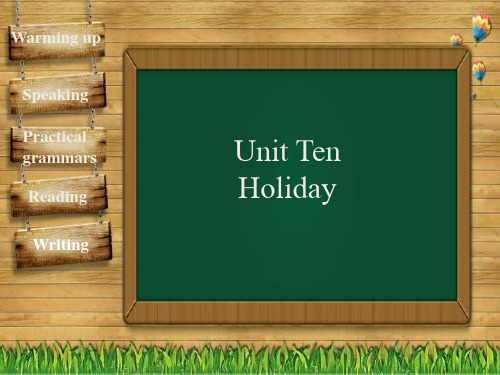
Dialogue 2
• W: Hi! Tom, will you be free tonight? • M: Yes, of course. Do you have some plans? • W: I want to go swimming. Are you interested in it? • M: Yes. I like it very much. • W: That’s very good. So, why not go together? • M: Good idea. Where shall we meet? • W: How about the school gate at 14:00? • M: No problem. See you then. • W: See you.
2. They give such campers a chance…to play games on soft green fields instead of white hard cement, a chance to experience activates they can only dream of during the rest of the year. 露营使营员们有机会……在松软的绿色原野而不是在坚硬的 白色水泥地上游戏玩耍,有机会亲自参加在一年中其他时 间里只能梦想的各种活动。
• 过去分词:规则动词的过去分词构成与动词过去式相同,不规 则动词需要特殊记忆。
• 否定式:主语 + haven’t/hasn’t + 过去分词 + 其他 • 疑问式:Have/Has + 主语 + 过去分词 + 其他? • 简略答语:Yes, 主语 + have/has. (肯定) • No,主语 + haven’t/hasn’t. (否定)
英语基础模块(上册)_(Unit_10_Unit_12)_知识点汇总
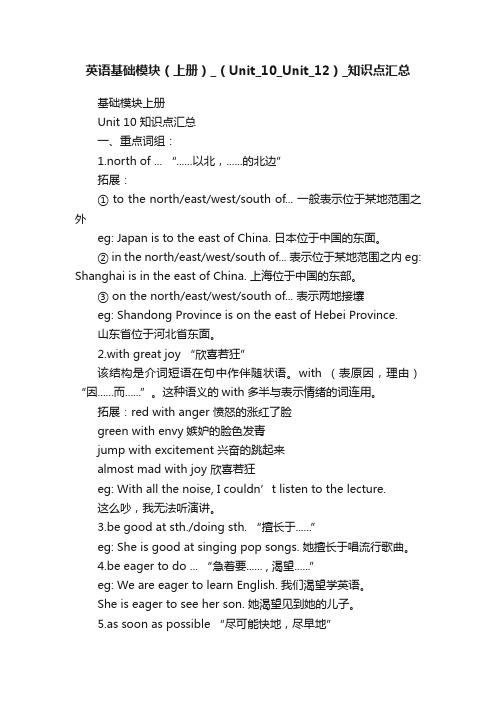
英语基础模块(上册)_(Unit_10_Unit_12)_知识点汇总基础模块上册Unit 10 知识点汇总一、重点词组:1.north of ... “......以北,......的北边”拓展:① to the north/east/west/south of... 一般表示位于某地范围之外eg: Japan is to the east of China. 日本位于中国的东面。
② in the north/east/west/south of... 表示位于某地范围之内eg: Shanghai is in the east of China. 上海位于中国的东部。
③ on the north/east/west/south of... 表示两地接壤eg: Shandong Province is on the east of Hebei Province.山东省位于河北省东面。
2.with great joy “欣喜若狂”该结构是介词短语在句中作伴随状语。
with (表原因,理由)“因......而......”。
这种语义的with多半与表示情绪的词连用。
拓展:red with anger 愤怒的涨红了脸green with envy 嫉妒的脸色发青jump with excitement 兴奋的跳起来almost mad with joy 欣喜若狂eg: With all the noise, I couldn’t listen to the lecture.这么吵,我无法听演讲。
3.be good at sth./doing sth. “擅长于......”eg: She is good at singing pop songs. 她擅长于唱流行歌曲。
4.be eager to do ... “急着要...... , 渴望......”eg: We are eager to learn English. 我们渴望学英语。
中职教育-英语(基础模块)上册第十章:Unit 10 We shuould take a vacation.ppt

What time of year do you usually go on vacation ? ______a. Around national holidays. ______b. In summer. ______c . Anytime . It doesn’t matter .
Which do you prefer when you arrive in a new place ? ______a. Stay in a pre-booked hotel ? ______b. Go to the tourist office to try and find a hotel. ______c . Choose an interesting area and walk around
1.“ will + 动词原形”
常用来表示将来存在的状态、将要发生的动作或习惯性、经常性的动作;还可以表示一种没
有经过仔细考虑的主观意图,可能是在说话的当时才做出的决定。
I will be 16 next year .
明年我就16岁了。(将来存在的状态)
He will go to the park tomorrow . 明天他要去公园。(将来发生的动作)
这周末我要带着孩子去动物园。 他一年后就要毕业了。 等一会儿,我马上就来。
22
4.一般现在时表示将来
表示按照时刻表要发生的事情,这种用法主要指严格按照原定计划、时刻表要发生的事情;在条
件状语从句和时间状语从句中,用一般现在时表示将来。
The sport meet takes place next week . We have no classes tomorrow . When she comes , I’ll tell her about it .
- 1、下载文档前请自行甄别文档内容的完整性,平台不提供额外的编辑、内容补充、找答案等附加服务。
- 2、"仅部分预览"的文档,不可在线预览部分如存在完整性等问题,可反馈申请退款(可完整预览的文档不适用该条件!)。
- 3、如文档侵犯您的权益,请联系客服反馈,我们会尽快为您处理(人工客服工作时间:9:00-18:30)。
Unit10~( )7. You have ______ little money that you can’t afford to buy _____ a big house.A. so; soB. such; suchC. so; suchD. such; so( )8. Don’t do it like this _____ next time.A. any longB. no moreC. no longerD. any more( )9. Do you know who ______ the gold medalA. wonB. winC. defeatD. defeated( )10. As we all known, Japan lies _____ the east of China.A. inB. onC. toD. at( )11. ---How often do you write to your sister---_______}A. Twice a monthB. Second times a monthC. Second a time a monthD. A second time a month( )12. “Not all the students can understand the teacher in class”means _____.A. All the students can’t understand the teacher in classB. None of the students can understand the teacher in classC. No students can understand the teacher in classD. All the students understand the teacher in class( )13. Do you want to ______ part in the gameA. joinB. takeC. join inD. joined( )14. When did your brother _____ the army|A. joinedB. join inC. take part inD. join( )15. People put vegetables in the bridge in order to _____ them fresh.A. keepB. stayC. makeD. let( )16. There is a stone bridge _____ the river.A. overB. aboveC. atD. On( )17. The Great Wall runs _____ north China like a huge dragon.A. overB. onC. crossD. across( )18. She was angry _____ the damage, and _____ the driver for having caused it.A. at; atB. at; withC. with; withD. with; at( )19. Your composition is good ______ a few mistakes here and there./A. besidesB. exceptC. except forD. except that( )20. He decided to visit the family ______ Friday night.A. atB. inC. onD. Over( )21. A battle _____ the Persians and the Greeks happened.A. betweenB. amongC. fromD. for( )22. When he _____ the mountain at last, he was out of breath.A. reached toB. arrived toC. gotD. got to( )23. _____ great joy, they rushed to the street.A. AtB. WithC. ByD. Under( )24. He thought over and over and at last a good idea _____.|A. comes outB. came onC. comes upD. came along( )25. She is ______ silent girl that she seldom talks.A. suchB. such aC. such anD. so( )26. Sorry, all the tickets _____.A. has sold outB. have sold outC. has been sold outD. have been sold out( )27. Sorry to keep you _____ for so long outside.A. waitB. waitedC. waitingD. to wait( )28. He has been a taxi driver ______ he resigned (辞职).A. afterB. sinceC. fromD. when·(( ) 34. A. but B. and C. nor D. Or( ) 35. A. party B. meeting C. shop D. hotel( ) 36. A. shake hands to B. shake hands C. look at D. laugh at( ) 37. A. take B. make C. hold D. pay( ) 38. A. also B. so C. however D. and( ) 39. A. go B. come C. have come D. have gone( ) 40. A. lately B. latest C. later D. late四、阅读理解:阅读下列短文,从每题所给的ABCD 四个选项中,选出最恰当的答案。
AWhen I lived in England, an English woman was so warm-hearted that she often helped me. Once I wanted to go shopping, she volunteered to be my guide. I was moved a lot and wanted to say thanks to her. So I said, “Thank you! Thank you!”she was too surprised to say any words. After a while, she seemed to understand me and laughed and said “I can swim!”Suddenly I realized I had made a big mistake in my pronunciation. It was one of the funniest mistakes I had made in England. I pronounced “thank”into “sank”by mistake.:English people have problems too when they learn foreign languages. Once an English friend of mine was in Paris, when a waiter wanted to serve him some more coffee, he said “Thank you”in French. He meant that he would like some more. However, to his surprise the coffee pot was taken away! Later he found out that “thank you”in French means “No, thank you.”( ) 41. When the author said thanks to her, why was the woman too surprised to say any words A.Because she was too glad to say any words. B. Because she was a dumb.C. Because she couldn’t hear what the author said.D. Because the author pronounced “thank you”into “sank you!”( ) 42. Which sentence is true according to the passageA. The author is an English woman.B. The author is a Frenchman.C. The author is not English, and his English pronunciation is not good.D. The author is English, but his English pronunciation is very poor.( ) 43. What is the main idea of the passage>A. English is hard to learn.B. French is hard to learn.C. Any foreign language is hard to learn.D. It is unavoidable for anyone to have problems in speaking a foreign language. ( ), when a waiter wanted to offer a guest more coffee in Paris and the guest said “Thank you”in French, the guest______.A. didn’t want any more coffeeB. wanted them to take the coffee pot awayC. really wanted some more coffeeD. wanted to express his politeness( ) the passage, the Englishman was surprised when the coffee pot was taken away when he said “thank you”to the waiter, because he ______.A. hadn’t finished drinking his coffeeB. was expecting another cup of coffeeC. meant that he didn’t want any moreD. was never misunderstoodBAs many as 10 of the 17 kinds of penguins(企鹅)may be in danger of disappearing. The number of penguins has decreased by 30% since 1987.`Penguins are black and white birds that live in the southern part of the world. They are common in South America, New Zealand, Australia and South Africa. Many live near cold waters. But some live near warm waters in Galapagos Islands. Penguins cannot fly, but they are fine swimmers. Penguins eat fish and krill. The warming of the earth is the cause of the decrease in penguin populations. The heating of the air has caused ocean waters to become warmer. Higher water temperatures have reduced the supply of fish and krill. Some years later these birds are completely unable to reproduce. Besides, many adult penguins die of hunger.Widespread fishing, exploration for oil and oil leaks also make penguins be in danger. Poisonous organisms in ocean water are another danger. Penguins also have their enemies, including wild dogs,sharks, seals and sea lions.News about penguins is not all bad. However, several years ago,oil leaking from a ship hurt 40% of the penguins in South Africa. The penguins became covered with oil. But thousands of people helped clean and treat the birds well. Then they returned the penguins to the wild. Now these South African penguins are reproducing in higher numbers than before the oil leaking.( ) ___________ .A. can swim better than flyB. can be found near OceaniaC. eat fish onlyD. live only in cold waters( ) 47. Which of the following is not the cause of penguin’s decrease in numbersA. Oil searching.B. Widespread fishing.C. Human’s killing.D. Warming of the oceans.<( ) 48. Why are the penguins in South Africa reproducing in higher numbers than before the oil leakingA. Because people removed the ship.B. Because people sent a lot of penguins to the wild.C. Because people helped the penguins.D. Because people treated the penguins well.( ) 49. Which sentence is true according to the passageA. All kinds of penguins are in danger of disappearing.B. Penguins are birds that live in the northern part of the worldC. The warming of the earth is the cause of the decrease in penguin populationsD. No news about penguins is bad( ) 50. Please choose the best title for the passage.A. Protecting Our EnvironmentB. About Penguins·C. Ocean is Important for PenguinsD. How to Protect the Wild AnimalsCNew Zealand is located in the South Pacific Ocean over 1,000 miles southeast of its nearest neighbor, Australia. It consists of two main islands -- the North Island and the South Island and a number of little islands, some of which are hundreds of miles away from the main group. Its population in the early 1970s was almost 2,900,000. The land area covers over 260,000 square kilometers. About two-thirds of the land is economically developed or developing, the rest being mountainous, especially good for tourism.Since the Second World War there have been great changes in culture and in the arts of New Zealand. These changes have much to do with the improvement of education. Today, artists, musicians and writers have a much wider public than before. Far more people now read books and go to the theaters, concerts, picture galleries and fashion shows.New Zealanders have been known as great art collectors. Their collections can be seen today in museums, and in picture galleries in many cities which are open to the public. A few artists have been very successful and have had their works accepted by well-known art galleries all over the world. Because of its rich cultural and natural resources, tourism in New Zealand has been growing rapidly. Now there are about 900 thousand visitors from all parts of the world every year. The Green Precious Stone in the South Pacific has become one of the most attractive places for tourists today.( ) 51. New Zealand is a country lying_____.A.in AsiaB. in the PacificC. southwest of AustraliaD. in the north part of the earth( ) 52. New Zealand is a country with_____.A. a large area and a large populationB. a small area and a large population-C. a large area and a small populationD. a small area and a small population( ) 53. Cultural development in New Zealand is mainly related to_____.A. the end of the Second World WarB. its unique locationC. its development in educationD. its great art collectors( ) 54. The reason why tourism is growing rapidly is that_____.A. New Zealand has rich cultural and natural resourcesB. New Zealand has many art collectorsC. more New Zealanders now go to the theaters, concerts, galleries and fashion showsD. one-third of New Zealand is mountainous( ) 55. The Green Precious Stone is actually_____.!A. a precious stoneB. a piece of green jadeC. an attractive scenic place in New ZealandD. New Zealand itself五、词义搭配:从 B 栏中选出 A 栏单词的正确解释。
